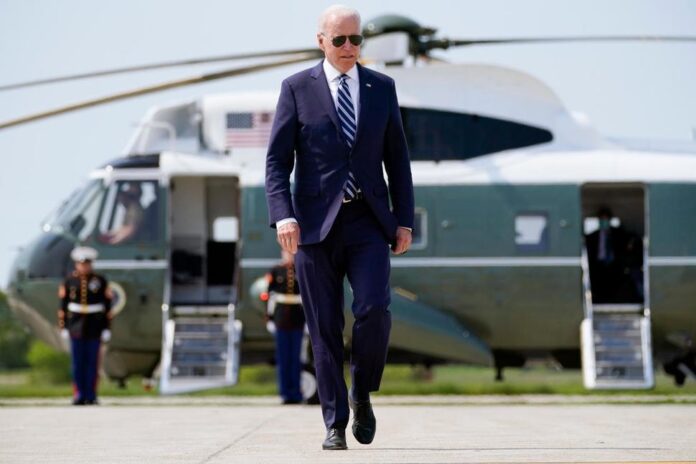| Translate This News In |
|---|
President Joe Biden’s efforts to persuade Israeli Prime Minister Binyamin Netanyahu to end military strikes against Hamas in Gaza have thrown the two leaders into a difficult early test of their relationship.
Their differences over the war in Gaza have created a challenge that Biden was desperately trying to avoid.
According to the White House, Biden told Netanyahu in a phone call on Wednesday that the fighting would “significantly de-escalate” by the end of the day. However, the prime minister quickly responded with a public statement that he was “determined to continue” the Gaza operation “until its goal is achieved.”
Netanyahu acknowledged that he “greatly appreciates” Trump’s support, but insisted that Israel would go ahead regardless.
Biden had not planned to spend his time and energy in this manner.
Foreign policy has taken a backseat during Biden’s first term. The president has tried to avoid becoming engrossed in the never-ending pursuit of an elusive Mideast peace, which many of his White House predecessors have devoted significant time and effort to, with little success.
This isn’t the first time that Biden and Netanyahu have clashed in public.
After Netanyahu embarrassed President Barack Obama by approving the construction of 1,600 new apartments in disputed east Jerusalem during Biden’s 2010 visit to Israel, Biden kept Netanyahu waiting for a dinner meeting as vice president.
At the dinner, Netanyahu attempted to mend broken hearts. However, in a statement released after the meal, Biden chastised Netanyahu, saying his actions jeopardised the US effort to persuade Palestinians to resume peace talks.
During a 2014 speech to the Jewish Federations of North America, Biden went out of his way to say that he and Netanyahu were “still buddies,” albeit with a tense relationship. “Bibi, I don’t agree with a damn thing you say but I love you,” Biden said, referring to a photo he once inscribed for Netanyahu.
Biden called Netanyahu a “counterproductive” and “extreme right” leader during a question-and-answer session with voters on the campaign trail in late 2019. He also accused Palestinian leaders of “fomenting” the conflict and “baiting everyone who is Jewish,” and he suggested that some on the left in the United States give the Palestinian Authority “a pass” when criticising Israeli leadership.
Netanyahu had a much better relationship with Trump, whom he praised for relocating the US Embassy from Tel Aviv to Jerusalem and brokering normalisation of relations between Israel and Gulf neighbours Bahrain and the United Arab Emirates, as well as Morocco and Sudan.
Biden’s request that Netanyahu de-escalate the fighting came as political and international pressure mounted on the US president to intervene more forcefully to bring the fighting to an end. Until Wednesday, Biden had avoided pressing Israel for a cease-fire in a more direct and public way, or conveying the urgency with which Israel should end its airstrikes on Hamas in the densely populated Gaza Strip.
Instead, his administration has used “quiet, intensive” diplomacy, including vetoing a United Nations Security Council statement on a cease-fire. Biden and some Democratic lawmakers are split over the administration’s handling of the situation, with dozens calling for a cease-fire.
Egypt and others have attempted, but failed, to broker a cease-fire, while Hamas officials have stated publicly that they will continue to fire rockets into Israel as long as Israel continues to carry out airstrikes.
In his statement, Netanyahu made it clear that Israeli strikes on Hamas leaders and supply tunnels in Gaza, a 25-mile by 6-mile strip of land home to more than 2 million people, were not going to stop anytime soon.
“Every day, we strike at more of the terrorist organisations’ capabilities, targeting more senior commanders, toppling more terrorist buildings, and hitting more weaponry stockpiles,” Netanyahu said.
The White House did not respond directly to Netanyahu’s statement, but said top Biden advisers were still in contact with their Israeli counterparts “hour by hour.”
Secretary of State Antony Blinken spoke with Israeli Foreign Minister Gabi Ashkenazi on Wednesday and “reinforced the message that the United States expects de-escalation on the path to a ceasefire,” according to the State Department.
Reps. Ocasio-Cortez, Tlaib, and Mark Pocan of Wisconsin introduced a resolution opposing the sale of $735 million in military weaponry to Israel, which had already been approved by the Biden administration, shortly after Netanyahu announced he planned to continue operations. Separately, 138 House Democrats signed a letter urging Biden and his administration to “boldly lead and take decisive action to end the violence,” organised by Rep. David Price of North Carolina.
The fighting has killed at least 219 Palestinians and 12 Israelis, making it the deadliest Israeli-Palestinian conflict since 2014.
According to a person familiar with the ongoing discussions, top Biden administration officials have recently stressed to Israeli officials that time is not on their side as international objections to their operations grow and domestic pressure grows on Biden.


















